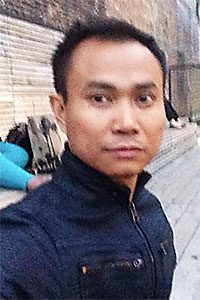
The regime's responses to plummeting rice prices have been both disappointing and disastrous to it and farmers.
The worst came from government spokesman, Lt Gen Sansern Kaewkamnerd, who said a 43-year-old farmer in Phichit, who committed suicide because of debt caused by the price crisis, "was not a farmer, but an air-conditioner mechanic". It was a knee-jerk, unchecked and heartless response.
The second worst came from Prime Minister Prayut Chan-o-cha who on Monday told farmers to do more to look after themselves and not rely solely on financial aid from the state.
He simply told them his government cannot spend above the approximately 65-billion-baht budget set aside for storage credit schemes and a giveaway package to help farmers cushion the crisis.

Surasak Glahan is deputy oped pages editor, Bangkok Post.
It is obvious that Gen Prayut is taking cautious steps in implementing his subsidy scheme, which is, for many people, a model copied and pasted from many previous governments, including the Yingluck Shinawatra administration, and repackaged under a new brand.
Allowing expenditure to grow could make the government measures look identical to the policy of Ms Yingluck. She is being forced to pay back 35.7 billion baht as part of an accumulated loss of over 178 billion baht caused by her similar rice-pledging scheme.
Amid the crisis, the regime was still critical of Ms Yingluck's "publicity stunt" of buying rice during meetings with farmers last week. Gen Prayut urged politicians to "stop exploiting the plight of farmers for political motives".
We have heard similar calls from various sources for politicians to refrain from making rice a political commodity over and over again. What's wrong with politicising rice and making it a key political commodity if it translates into assistance packages to rescue farmers from crisis? A political motive needs to offer both immediate subsidies and long-term solutions.
Those who say Ms Yingluck extravagant subsidy scheme was simply aimed to please farmers and target their votes just fits their narrative against vote-hungry politicians. However, these politicians made rice a political commodity because serious problems affected a sizeable number of people, large enough to make their votes meaningful. The Pheu Thai Party wouldn't have won farmers' votes if others had offered a better proposal.
The military are not politicians and so are not obligated to please voters. So it's not surprising Gen Prayut has set a limit on his government's rescue package. However, the 65-billion-baht budget the government has committed so far, and eventually expects back, is much less than the increased 2017 annual defence budget of 211 billion baht earmarked to keep the military bureaucracy running.
There are about 23 million farmers in the country and the government is only committed to spending less than a quarter of its military budget in rescuing them? We are currently living in a world where more is given to small groups of people and less is given to the masses.
The regime's move to seek compensation from Ms Yingluck is not sensible. It is disappointing the government has looked upon her subsidy scheme as if it was a commercial investment requiring a return or interest.
No matter how flawed this policy was, it was a large rescue package made available to the backbone of the country. The reported accumulative loss of 178 billion baht for the 2012-2014 period is still lower than the annual military budget. We are not at war. Why can't we afford the same amount for farmers when we can do so for the military?
Ms Yingluck is going to be the first and probably the last former head of government in Thailand or elsewhere to be forced to pay back such losses, even though Gen Prayut is getting a taste of real politics with his subsidy measures which also risk losses if farmers are unable to redeem their pledged rice.
His proposed long-term remedies are nothing new. Several politicians have touted them before and many farmers have tried some. But the government and all the agencies involved must make them a reality, rather than talk shop.
The death of the Phichit farmer, who couldn't afford to pay college tuition fees for his two children, reminds us that farmers are bearing the same burdens as most of the rest of us.
We can no longer live with the myth that farmers can survive on whatever means they have at their disposal. Implementing long-term solutions will not be easy.
But we must accept reality in the farming sector. And for as long as farmers remain in peril, let's politicise rice and make it a worthy political commodity.
